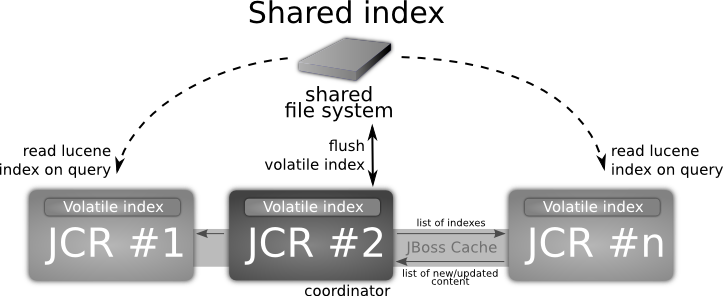Warning
You are looking at documentation for an older release. Not what you want? See the current release documentation.
For some reasons having a multiple index copies on each instance can be costly, the shared index can be used.

This indexing strategy combines advantages of in-memory index along with shared persistent index offering "near" real time search capabilities. This means that newly added content is accessible via search immediately. This strategy allows nodes to index data in their own volatile (in-memory) indexes, but persistent indexes are managed by single "coordinator" node only. Each cluster instance has a read access for shared index to perform queries combining search results found in own in-memory index also. Take into account that shared folder must be configured in your system environment (for example: mounted NFS folder). However, this strategy in some extremely rare cases may have a bit different volatile indexes within cluster instances for a while. In a few seconds they will be updated.
<query-handler class="org.exoplatform.services.jcr.impl.core.query.lucene.SearchIndex">
<properties>
<property name="index-dir" value="/mnt/nfs_drive/index/db1/ws" />
<property name="changesfilter-class"
value="org.exoplatform.services.jcr.impl.core.query.ispn.ISPNIndexChangesFilter" />
<property name="infinispan-configuration" value="infinispan-indexer.xml" />
<property name="jgroups-configuration" value="udp-mux.xml" />
<property name="infinispan-cluster-name" value="JCR-cluster" />
<property name="max-volatile-time" value="60" />
<property name="rdbms-reindexing" value="true" />
<property name="reindexing-page-size" value="1000" />
<property name="index-recovery-mode" value="from-coordinator" />
</properties>
</query-handler>